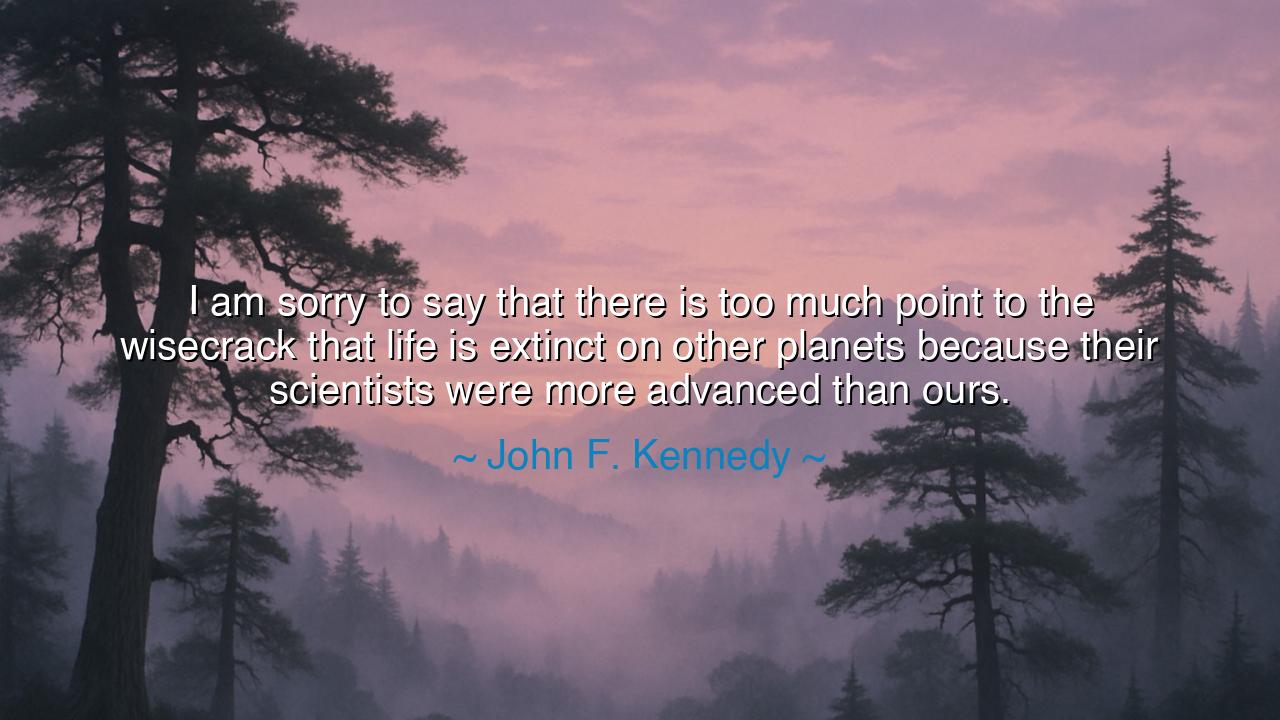
I am sorry to say that there is too much point to the wisecrack
I am sorry to say that there is too much point to the wisecrack that life is extinct on other planets because their scientists were more advanced than ours.






In the vastness of existence, where the stars shine with the ancient wisdom of the cosmos and the heavens stretch beyond human comprehension, there is a truth that we must face with humility: progress is not guaranteed. John F. Kennedy, a leader whose vision reached toward the stars, once spoke with a sharp wit and a grave truth: "I am sorry to say that there is too much point to the wisecrack that life is extinct on other planets because their scientists were more advanced than ours." In these words lies not just a humorous remark, but a profound reflection on the nature of humanity, science, and the fate of civilizations. It is a warning to all who seek to advance without wisdom, and to those who believe that progress alone can secure the future.
Kennedy’s words remind us that no matter how far we travel, no matter how much we discover, there is always the possibility of failure, of self-destruction, of a society that outgrows its ability to sustain itself. For science—as wondrous and powerful as it is—does not exist in a vacuum. It must be guided by wisdom, tempered with caution, and driven by a sense of responsibility to all life. Without these, even the greatest of scientific advancements can lead to ruin, as Kennedy subtly suggests. The wisecrack he speaks of, though light in its delivery, is a reflection of the tragic reality that civilizations—whether on Earth or beyond—can fall victim to their own creations, to the very forces they have set into motion.
Consider the great ancient civilizations that rose to power and brilliance—Rome, Athens, Babylon—each of them reached remarkable heights of knowledge, governance, and culture. Yet, each also faced the threat of collapse, brought about by the very forces they had mastered. Rome, in its might, fell not simply to external forces, but to its own internal corruption and overreach. The wisdom that propelled these societies forward was often abandoned in favor of unchecked ambition, and they crumbled under the weight of their own failures. In this, Kennedy’s words are a stark reminder: that progress without wisdom and humility is a double-edged sword, one that can both build and destroy.
In modern times, we see echoes of this danger in our own technological advancements. The nuclear age brought forth both the promise of unlimited energy and the threat of unimaginable destruction. The development of technology has brought incredible benefits to humanity, from medical breakthroughs to the ability to reach the stars themselves. Yet, these same advancements carry with them the potential for great harm—if not wielded with care and foresight. The arms race, the creation of weapons of mass destruction, and the unchecked consumption of the Earth’s resources all stand as testaments to the dangers that arise when we fail to balance progress with responsibility. Kennedy’s wisecrack speaks to this delicate balance: that without the guiding hand of wisdom, even the greatest advances can lead to our undoing.
It is also worth reflecting upon the exploration of space itself, which Kennedy championed as both a scientific and human endeavor. The space race—fueled by the desire to reach new frontiers—was a symbol of human ingenuity and ambition. Yet, it was also a reminder of the fragility of human civilization. As we look to the stars and dream of other worlds, we must ask ourselves: What will we find when we venture beyond? Will we encounter civilizations that have reached their pinnacle and fallen, like those before us? Or will we learn from their mistakes, recognizing that true progress is not measured by the heights we reach, but by our ability to maintain balance and harmony with the world we inhabit?
O children of the future, take heed of Kennedy’s words. As you stand at the precipice of new discoveries and new frontiers, remember that science is not the answer to all problems, nor is progress an unqualified good. True wisdom lies in understanding that knowledge without wisdom can lead to ruin. The forces of nature are not subject to our will, but to our understanding of them. It is not enough to push forward relentlessly, for unchecked ambition without a deep sense of responsibility can destroy what we have built. Seek not just to advance in knowledge, but to grow in wisdom. For it is in this balance—between progress and humility—that humanity will find its greatest strength.
The lesson, then, is this: progress, when guided by wisdom, can lead us to great heights, to discovery and enlightenment. But without wisdom, progress is a force that can easily spiral out of control, bringing with it destruction rather than advancement. Let Kennedy’s words be a warning and a guiding principle: as we reach for the stars, let us not forget the lessons of the past. Let us not be so consumed with progress that we neglect the responsibilities it demands. Seek not just to conquer new worlds, but to do so with the knowledge that the true victory lies not in what we discover, but in how we preserve the world we already have.






AAdministratorAdministrator
Welcome, honored guests. Please leave a comment, we will respond soon